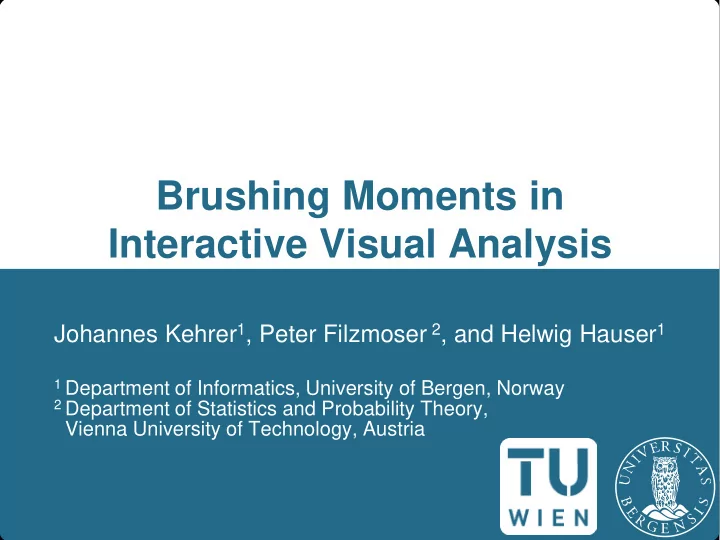

Brushing Moments in Interactive Visual Analysis Johannes Kehrer 1 , Peter Filzmoser 2 , and Helwig Hauser 1 1 Department of Informatics, University of Bergen, Norway 2 Department of Statistics and Probability Theory, Vienna University of Technology, Austria
Higher-dimensional Scientific Data Considering “scientific” data f , i.e., 3D time-dependent multi-run simulation data some data values f(p) data distribution per cell (e.g., temperature, pressure values) measured/simulated wrt. a domain p (e.g., 2D/3D space, time, simulation input parameters) If dimensionality of p > 3, then traditional visual analysis is hard Reducing the data dimensionality can help (e.g., computing statistical aggregates) Kehrer et al.: Brushing Moments in Interactive Visual Analysis 1
Reducing the Data Dimensionality [from IPCC AR #4, 2007] Statistics: assess distributional characteristics along an independent data dimension (e.g., time, spatial axes) Integrate aggregated statistics into average temp. in ten years visual analysis through attribute derivation Kehrer et al.: Brushing Moments in Interactive Visual Analysis 2
Example: Multi-run Climate Simulation Data CLIMBER-2 model: Meltwater outburst of Lake Agassiz 3D atmosphere 250 time steps 240 runs (7 model parameters) Compute local statistics wrt. multiple runs timestep 80 Kehrer et al.: Brushing Moments in Interactive Visual Analysis 3
Moment-based Visual Analysis Get big picture ( data trends & outliers) Multitude of choices , e.g, statistical moments 4 (mean, std. deviation, skewness, kurtosis) ×3 traditional and 2 robust estimates compute relation ×2 (e.g., differences, ratio) change scale ×3 (e.g., data normalization, log. scaling, measure of “outlyingness”) = 72 possible configurations per axis How to deal with this “management challenge”? Kehrer et al.: Brushing Moments in Interactive Visual Analysis 4
Moment-based Visual Analysis Iterative view transformations alter axis/attribute configuration (construct a multitude of informative views) maintain mental model of views classification of moment-based views Relate multi-run data aggregated data quantile plot (focus+context) multi-run data aggregated data Kehrer et al.: Brushing Moments in Interactive Visual Analysis 5
Visualizing Data Distributions Sample quantile q(p) of a distribution { x 1 ,…,x n } ( p ∈ [0, 1]) at least n· p observations ≤ q(p) 25% 25% at least n·(1-p) observations ≥ q(p) 25% 25% Examlpes: median q 2 = q(½), quartiles q 1, q 3 q 1 q 2 q 3 Quantile plot quantile plot shows all data items of a distribution assess data characteristics normal distr. q(p) (normal dist., symmetrical, skewness, possible outliers, etc.) q 3 q 1 q 2 p Kehrer et al.: Brushing Moments in Interactive Visual Analysis 6 6
Robust Statistics Outlier influence traditional estimates median mean q 3 Robust estimates of std. deviation interquartile range 0.741· interquartile range (IQR) q 2 q 1 median absolute deviation MAD( x 1 ,…,x n ) = 1.483 · med 1 ≤ i ≤ n (| x i – median |) Kehrer et al.: Brushing Moments in Interactive Visual Analysis 7 7
Robust Statistics Estimates of skewness neg. skewness ( ) − 3 1 x x traditional ∑ = n = i (left skewed) skewness 3 i 1 n s median/MAD-based mean median ( ) − 3 1 x median ∑ = n = i skew pos. skewness MAD 3 i 1 n MAD ( x ,..., x ) 1 n (right skewed) + − e e 2 e octile-based = 7 1 4 skew oct − median mean e e 7 1 Analogous estimates neg. pos. for kurtosis kurtosis kurtosis Johannes Kehrer Kehrer et al.: Brushing Moments in Interactive Visual Analysis 8 8
Iterative View Transformations Change axis/attribute configuration of view change order of med/MAD-based traditional octile-based moment robustify moment compute relation (e.g., difference or ratio) Closer related to data tranformations change scale (e.g., normalize, z-standardization) Kehrer et al.: Brushing Moments in Interactive Visual Analysis 9
Basic View Setup: Opposing Different Moments 3 rd vs. 2 nd moment change order of 1 st vs. 2 nd moment moment 3 rd vs. 4 th moment quantile plot study relations (focus+context) btw. moments investigate basic characteristics of distributions multi-run data aggregated data 10
Views: Opposing Different Moments robustify moment assess influence of outliers traditional octile-based estimates estimates Kehrer et al.: Brushing Moments in Interactive Visual Analysis 11
Views: Traditional vs. Robust Estimates robustify moment assess influence of outliers 12
Other View Transformations compute relation quantiles of distance to median (e.g., difference or ratio) original data change scale (e.g., z-standardization, z-score normalize to [0,1]) (measure of outlyingness) Kehrer et al.: Brushing Moments in Interactive Visual Analysis 13
Other View Transformations Q-Q plot detrended Q-Q plot x-axis subtracted from y-axis change scale compute relation compare with (e.g., difference) theoretical distribution Kehrer et al.: Brushing Moments in Interactive Visual Analysis 14
Analysis of Multi-run Climate Data CLIMBER-2: Meltwater outburst of Lake Agassiz (7 model parameters) 3D atmosphere 250 time steps 240 runs 15
Conclusion Data aggregation enables complex analysis relating higher-dimensional data aggregated statistics analyst can work with both (original data, stat. properties) Traditional and robust estimates of moments (many opportunities also create management challenge) Iterative view transformations helps analyst to maintain a mental model of views matches the iterative nature of visual analysis Classification of informative views opposing different moments traditional vs. robust estimates of same moment Kehrer et al.: Brushing Moments in Interactive Visual Analysis 16
Acknowledgements Helmut Doleisch, Philipp Muigg www.SimVis.at Thomas Nocke, Michael Flechsig (PIK) Datasets are courtesy of VisGroup in Bergen, especially Armin Pobitzer, Stian Eikeland Kehrer et al.: Brushing Moments in Interactive Visual Analysis 17
Recommend
More recommend